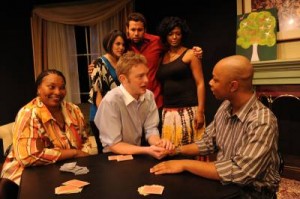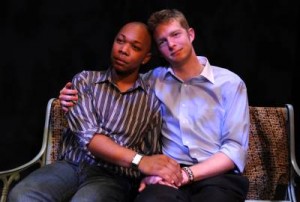
Diversionary Theatre’s production of Paul Oakley Stovall’s As Much As You Can couldn’t come at a more appropriate moment, November’s Yes On 8 victory having focused attention on the African American community’s attitudes towards gays and lesbians in general and same-sex marriage in particular. These timely topics form the heart of Stovall’s perceptive, thought-provoking, hopeful, and downright hilarious comedy, a contemporary gay take on Guess Who’s Coming To Dinner.
As Much As You Can had its West Coast Premiere exactly a year ago, in a production at the Celebration Theatre starring the playwright himself and Tony nominee Tonya Pinkins. Though Diversionary’s production (in collaboration with San Diego Black Ensemble Theatre) may lack the star-power of the Celebration’s, it has the distinct advantage of being a much expanded (by about twenty minutes), considerably richer rewrite of last year’s 80-minute one-act.
Manhattanite Jesse Bryant (Kevane La’Marr Coleman) is a thirty-something GBM whose younger brother Tony (Patrick Kelly) is about to get married in their native Chicago, prompting a visit home by Jesse, his Swedish boyfriend Kristian (Brian Mackey) in tow, ostensibly to “shoot some video” of the wedding ceremony. Also there for the wedding are Jesse and Tony’s half-sister Ronnie (Leticia Martinez), the product of their father’s affair with a white Belgian woman; Jesse’s best girlfriend, the “lesbonic” Nina (Melissa Coleman Reed); and their oldest sibling, the devoutly homophobic Evie (Ida L. Rhem).
As Evie prepares a Black Pride speech centering on Malcolm X, Jesse is being encouraged by Nina and Ronnie to present Kristian to his elder sister as more than just a “friend” he is bringing to the wedding. Ronnie, “the artist and international beauty,” is the most completely accepting of Jesse and his relationship with Kristian, perhaps because she herself has at times felt like an outsider with her late father’s “real” family. Meanwhile, Nina tells Jesse to “look up the word ‘husband’ in the dictionary instead of in the Bible” and he’ll realize that Kristian and he are indeed married in the truest sense of the word. Kristian too is not particularly thrilled about pretending to be just a friend, telling Jesse that “you’re not really out if you leave it for other people to figure out.”
Tony at first cautions Jesse “not to be all over” Kristian at the wedding, though he is more upset by the discovery that his older brother’s lover is white. (Not white, corrects Jesse. European.) Not surprising that Tony, who has often been taken to be white, has issues with color; as a child, he had Caucasian friends who would change towards him once learning that their buddy was African American. Tony rather quickly changes his tune about accepting Kristian, something that will almost certainly not be the case with Evie, who still believes that Jesse can be “healed” though the power of Jesus.
Without ever forgetting that it is a comedy, As Much As You Can manages to raise many of the questions and arguments which made up much of the Prop 8 campaign and its aftermath. Evie’s Bible is never far from her grasp, and Leviticus never far from her lips. For her, it is (no pun intended) a black and white issue; one either sins or chooses not to, and in “choosing” to be with a man, Jesse is committing a offense against God and nature. When Nina suggests Bayard Rustin as an alternate Civil Rights pioneer for Evie’s upcoming speech, Evie calls up a friend to find out who Rustin was, prompting a “He was what?!” (Rustin, besides having refused to give up his seat on the bus a full ten years before anyone had heard of Rosa Parks, happened to be both black and gay.)
In Stovall’s play, Evie represents precisely those in the African American community to whom gays and lesbians need to reach out, those whose hearts need to be touched and whose minds need to be opened by the loving reality of committed same-sex relationships. If Evie can come around, Stovall is saying, then there is hope that even the most closed-minded can do the same.
Several scenes have been added to the show L.A. audiences saw last year at the Celebration, and As Much As You Can is the better for the extra length. (It’s a two-act play now.) In one new scene, Tony explains to Evie why it’s not possible to “disagree” with homosexuality—in words as simple and eloquent as I’ve ever heard, making her ultimate change of heart more believable. (Still, there really needs to be one more scene, perhaps one between Evie and Nina, in which the former explains just how and why she was able to move from condemnation to acceptance.) The second new scene, one which took me completely by surprise and had me bawling (as silently as possible, this being a theater) will not be revealed here, but it’s a great one.
Director Antonio T.J. Johnson deserves highest marks for the performances he has elicited from his cast, particularly those of the two leads. As Evie, Rhem more than holds her own against Broadway’s Pinkins, making the eldest sibling a veritable force of nature, almost frightening in her intransigence yet overflowing with familial love. Coleman subdues his natural effervescence, giving Jesse the requisite gravitas and strength to prove a formidable equal to his older sister. It is a performance of subtlety and depth.
Mackey’s Kristian is sweetness and strength personified, his scenes opposite Coleman believable and touching, and he is particularly good in the one in which he opens Evie’s eyes to the loving father he is to his son and the devoted partner he is to Jesse. Reed steals every scene she’s in as the voluptuous, vivacious, and va-va-voomous Nina, and Kelly does fine work as the straight but not narrow Tony. Finally, making her acting debut as Ronnie, a role which she nailed after her very first audition (now, that’s a story!) is newcomer Martinez. The lovely neophyte performs with a naturalness and spontaneity often lacking in more seasoned pros, crying real tears when recalling being dragged by her mother down the street towards her father’s house for the first time at age 11 or 12.
About the only nit to pick with Diversionary’s production is that Coleman and Reed look scarcely a day over 23, so it does strain credibility that Jesse could have raised 20something Tony, supposedly 10 or so years younger, or that Mackey could have a 12-year-old son. Fortunately, their performances make up for this.
Design elements are all excellent, from Jane Lamotte’s set design, which allows quick transformations from locale to locale, Joan Hanselman-Wong’s costumes, Chris Renda’s (indoor-outdoor) lighting, and Jason Connors’ sound design.
Diversionary will be continuing its oh-so-topical 2008-9 season with the next-up (and very powerful) Carol Lynn Pearson three-hander Facing East, which deals with yet another hot-button topic, the Mormon Church’s attitude towards gays.
In the meantime, As Much As You Can is must-see theater for San Diegans (and road-trip-ready Angelinos) in the mood for laughter and tears, and some food for post-performance conversation. If you happen to know an Evie, be sure to bring her (or him) along. You might just move another heart and change another mind.
Diversionary Theatre, 4545 Park Blvd., San Diego.
www.diversionary.org
–Steven Stanley
January 10, 2009
Photos: Ken Jacques




 Since 2007, Steven Stanley's StageSceneLA.com has spotlighted the best in Southern California theater via reviews, interviews, and its annual StageSceneLA Scenies.
Since 2007, Steven Stanley's StageSceneLA.com has spotlighted the best in Southern California theater via reviews, interviews, and its annual StageSceneLA Scenies.







 COPYRIGHT 2024 STEVEN STANLEY :: DESIGN BY
COPYRIGHT 2024 STEVEN STANLEY :: DESIGN BY